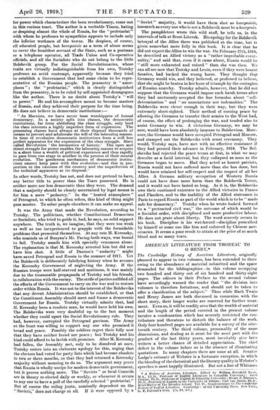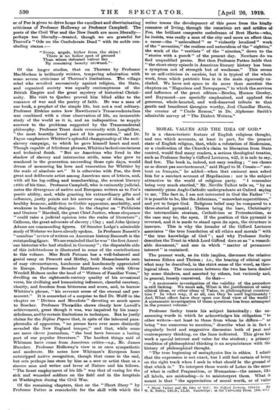AMERICAN LITERATURE FROM THOREAU TO 0 HENRY.*
The Cambridge History of American Literature, originally planned to appear in two volumes, has been extended to three owing to the abundance of material submitted and the space demanded for the bibliographies—in this volume occupying two hundred and thirty out of six hundred and thirty-eight pages. The editors in their Preface to the second volume have accordingly warned the reader that " the division into volumes is therefore fortuitous, and should not be taken to offer a classification of the subject." Thus while Mark Twain and Henry James are both discussed in connexion with the short story, their longer works are reserved for further treat. ment. Even so, it will be readily seen that the wealth of material and the length of the period covered in the present volume involve a condensation which has severely restricted the con- tributors and threatens to disturb the balance of the work. Only four hundred pages are available for a survey of the nine- teenth century. The third volume, presumably of the same dimensions, and dealing as it must for the most part with the product of the last thirty years, must inevitably give later writers a better chance of detailed appreciation. The chief defect in the volume before us is the absence of illuminating quotations. In many chapters there are none at all. Senator Lodge's estimate of Webster is a fortunate exception, in which the blending of the rhetorical and the literary quality in Webster's speeches is most happily illustrated. But not a line of Whitman • A History of American Literature. Edited by William Peterfleld Trent, ILA., LLD., Professor of English Literature In Columbia University; Jobs Erskine, Ph.D., Professor of English In Columbia University; Stuart P. hberwss, Ph.D., Protease, of English in the University of Illinois; Carl van Doren, Ph.D.. Head-Master of The Drearier Scheel. Vol. 11., Supplementary. to The Cantoridr History of l.nalieh Literature. Cambridge at the University Pall. New York; O. P. Pnlitam'a Sons, 17s, 05, net.i or of Poe is given to dive home the excellent and discriminating criticisms of Professor Holloway or Professor Campbell. The poets of the Civil War and the New-South are more liberally— perhaps too liberally—treated, though we are grateful for ramrod's " Ode on the Confederate Dead'" with its noble con- cluding stanza :—
" Stoop, angels, hither front the skies) There is no holier spot of Around
Than where defeated valour lren By mourning beauty crowned."• Of the longer studies, that on Thoreau by Profaner MacMeohan is brilliantly written, tempering admiration with some severe critioisma of Thoreau's limitations. The village rebel who revolted successively against religion, the State, and organized society wee equally contemptuous of the British Empire and the great mystery of historical Christi- anity. His visit to Quebec proved him blind alike to the romance of war and the poetry of faith. He was a man of one book, a prophet of the simple life, but not a real solitary. Professor Erskine notes how Hawthorne's Transcendentalism was combined with a close observation of life, an inexorable study of the world an it is, and an indisposition to supply answers to the problems suggested by the Transcendental philosophy. Professor Treat deals reverently with Longfellow, " the most heartily loved poet of his generation," and Dr. Payne emphasizes Whittier's splendid championship of the anti- slavery campaign, to which he gave himself heart and soul. Though capable of felicitous phrases, Whittierlackedconciseuess and technical finish. "But no American who lived in the shadow of slavery and internecine strife, none who grew to manhood in the generation succeeding those epic days, would dream of measuring his love and veneration for Whittier by the scale of absolute art." It is otherwise with Poe, the first great and deliberate artist among American men of letters, and, with all his log-rolling and tomahawking, the &cutest literary critic of his time. Professor Campbell, who is eminently judicial, notes the divergence of native and European writers as to Poe's poetic ability, and; while granting his extraordinary gifts and influence, justly ride out his narrow range of ideas, lack of healthy humour, addiction to Gothic apparatus, morbidity, and weakness in handling dialogue. In the chapter on "Publicists and Orators " Marshall, the great Chief Justice, whose eloquence " could raise a judicial opinion into the realm of literature" ; Calhoun, the great advocate of slavery ; Clay ; and John Quincy Adams are commanding figures. Of Senator Lodge's admirable study of Webster we have already spoken. In Professor Bassett's " omnibus " review of writers on American history Bancroft is the outstanding figure. We are reminded that he was " the first Ameri- - can historian who had studied in Germany "; the disputable side of this indebtedness is illustrated in some of the contributions to this volume. Miss Ruth Putnam has a well-balanced and genial essay on Prescott and Motley, both Massachusetts men of easy circumstances, handsome and handsomely appreciated in Europe. Professor Brander Matthews deals with Oliver Wendell Holmes under the head of " Writers of Familiar Verse," dwelling on the eighteenth-century quality of his occasional verse, his civilizing and humanizing influence, cheerful courtesy, charity, and-freedom from bitterness and scorn, and; to borrow Whittier's phrase, his reverent sense of the eternal and per- manent." It is somewhat of a surprise to find Dr. Wolff' in the chapter on " Divines and Moralists" devoting so. much space: to Beecher. Professor Thoredike shows clearly how- Lowell's achievement, great though it was, was impaired by his many sidednees, and by certain limitations in technique. But he justly claims for the Biglow Papers that, in spite of the laboured para- phernalia of apparatus, "no poems have ever more distinctly revealed the New England temper," and that, while some are mere clever journalism, " the beat have become a lasting part of our popular literature." The hardest things said of Whitman have come from American critics--e.g., Mr. James Huneker. Professor Holloway's view is- at once sympathetic and moderate. He notes how Whitman's European fame outstripped native recognition, though that came in the end, but sets perhaps less store by him as a seer or artist than as a sincere man and writer and lover of Nature and hie fellows. " The finest employment of his life " was that of caring for the sick and wounded soldiers on the field and in the hospitals at Washington during the Civil War.
Of the remaining chapters, that on the " Short Story " by Professor Patter is remarkable for the skill with which the writer traces the development of this genre from the kindly romance of Irving, through the conscious art and artifice of Poe, the brilliant composite melodrama of Bret Harts—who, he insists, was really a man of the city and more an effect than a cause—the " unlocalized " er " violently localized " work of the " seventies," the realism and naturalism of the " eighties," the work of the " veritista " of the " nineties," down to the "stories with a punch" of the present day. Nowhere do we find unqualified praise. But then Professor Pattee holds that "the short-story episode in American literary history has been a symptom not of strength but of weakness." This seems to us self-criticism in en:dais, but it is- typical of the whole work, from which patriotic bias is in the main rigorously ex- cluded. We have not space to do more than mention the chapters on "Magazines and Newspapers," in which the services and influence of the great editors—Bowles, Horace. Greeley, and Raymond—are specially emphasized, and applaud the generous, whole-hearted, and well-deserved tribute to that gentle and beneficent Georgian worthy, Joel Chandler Harris, the creator of "Uncle Remus," in Dr. Alphonse Smith's admirable survey of "The Dialect Writers."







































 Previous page
Previous page